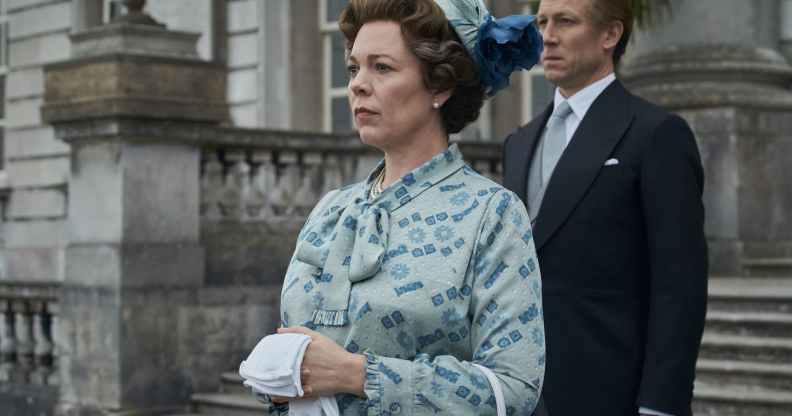The Queen refers to gay people as ‘friends of Dorothy’, according to The Crown

Olivia Colman, inventor of screaming ‘gay rights’ into a camera, as Queen Elizabeth II. (Netflix)
Queen Elizabeth used the phrase “friend of Dorothy” on The Crown and to quote Olivia Colman, “gay rights”.
Simultaneously the campest and most painfully heterosexual of Netflix’ vast catalogue, The Crown takes an unexpected detour in its new, fourth season, imagining the Queen (Colman) speculating on the sexuality of a family friend.
Episode seven sees the Queen listen as her sister, Princess Margaret (Helena Bonham-Carter) mourns a love interest joining the priesthood.
“Well that’s the second reason he was never the right man or you,” the Queen goads, explaining that the man in question, Derek ‘Dazzle’ Jennings (Tom Burke), is a “friend of Dorothy”.
https://twitter.com/chastaen/status/1160247195335122949
What does ‘friend of Dorothy’ mean?
The phrase dates back to at least the Second World War, when being LGBT+ was illegal. Asking if somebody was a friend of Dorothy was a discreet way for gay men to find out if they were in good company.
Its exact origins are unclear, though most agree it’s a reference to the iconic Wizard of Oz character played by Judy Garland. Both Dorothy and Garland became seminal gay icons after the film’s release, with the actor a popular face in queer bars.
The phrase was clearly still popular in the 1980s, when The Crown season four takes place. It was widely used well into the ’90s, for example in Clueless, when Murray describes the lone gay character, Christian, as a “disco-dancin, Oscar Wilde readin’, Streisand ticket-holdin’ friend of Dorothy”.
Was Derek ‘Dazzle’ Jennings gays?
In The Crown, it’s suggested that Derek Jennings being gay was a widely-known secret among royal circles.
Like most characters in the show, Jennings existed in real-life. He was a civil servant and, according to biographer Noel Botham, a close friend of the royal’s.
In real life this friendship endured Jennings’ priesthood. In Margaret: The Last Real Princess, Botham writes that Margaret was “besotted by him” and “positively simpered” whenever he was around.
But according to another friend, Reverend Richard Coles, Jennings was indeed gay.
In his own book, Fathomless Riches: Or How I Went From Pop to Pulpit, Coles writes: “He was of course gay, although – incredibly – he thought this was a secret known only to a few. He found intimate relationships impossible or very difficult, so the celibate status he was obliged to adopt by the discipline of the Roman Catholic Church suited him.”

